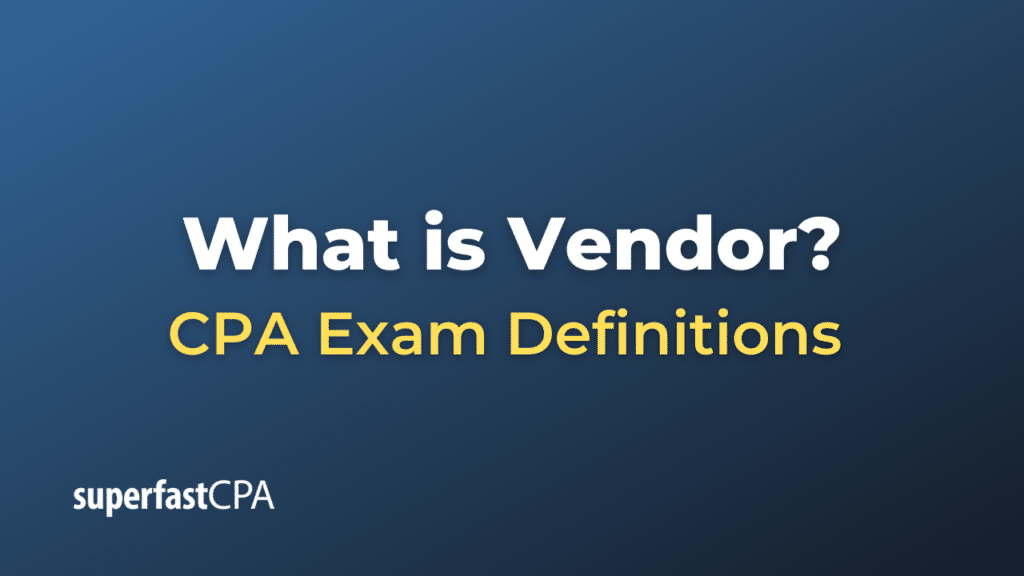Vendor
A vendor is an individual or business that provides goods or services to another entity, typically in exchange for payment. Vendors can operate in various markets and industries, serving businesses, consumers, or government agencies. They can offer a wide range of products, from physical goods like food, machinery, and raw materials, to services such as consulting, maintenance, or transportation.
Types of Vendors:
- Product Vendors: These vendors manufacture or distribute physical goods. Examples include food suppliers, hardware manufacturers, and clothing retailers.
- Service Vendors: These vendors offer specialized services rather than physical goods. This category includes consultants, maintenance providers, and transportation services.
- IT Vendors: Specialized vendors who provide information technology products or services, such as software, hardware, or IT consulting.
- Utility Vendors: Companies that provide essential services like water, electricity, and natural gas.
- Contractors and Freelancers: Individuals who offer specialized services on a contractual basis, often in fields like writing, graphic design, and programming.
Vendor Relationships:
- B2B (Business-to-Business): Vendors that primarily sell products or services to other businesses.
- B2C (Business-to-Consumer): Vendors that sell directly to consumers.
- B2G (Business-to-Government): Vendors that provide goods or services to government agencies.
- C2B (Consumer-to-Business): In some online marketplaces, individuals can offer goods and services to businesses, essentially acting as vendors.
Vendor Management:
Managing relationships with vendors involves various tasks like sourcing, negotiation, contract management, performance reviews, and payment processing. Good vendor management can lead to more favorable terms, better pricing, and improved service levels.
Example of Vendor
Let’s consider a simplified example of a vendor relationship in the context of a small coffee shop named “Cafe Delight.”
Cafe Delight’s Vendor List
- Coffee Bean Supplier: Provides different types of coffee beans.
- Product: Various types of coffee beans
- Payment Terms: Net 30 days
- Order Frequency: Bi-weekly
- Bakery: Supplies pastries and other baked goods.
- Product: Croissants, muffins, cookies
- Payment Terms: Cash on Delivery
- Order Frequency: Daily
- Milk Distributor: Provides dairy and non-dairy milk options.
- Product: Whole milk, skim milk, almond milk, oat milk
- Payment Terms: Net 15 days
- Order Frequency: Weekly
- Cleaning Supplies Company: Provides cleaning products.
- Product: Sanitizers, detergents, mops
- Payment Terms: Monthly
- Order Frequency: Monthly
- Paper Goods Supplier: Supplies cups, lids, napkins, and other disposable items.
- Product: Paper cups, plastic lids, napkins
- Payment Terms: Net 45 days
- Order Frequency: Monthly
Scenario: Quality Issue with Coffee Beans
One day, the owner of Cafe Delight notices that the coffee beans from the regular supplier have been inconsistent in quality, affecting the taste of the coffee.
Steps to Resolve:
- Identify the Issue: The owner pinpoints that the issue is with the coffee beans and not other variables like the brewing process or equipment.
- Communicate: The owner contacts the coffee bean supplier to discuss the issue and asks for an explanation.
- Review Contract: The owner reviews the contract to understand the terms related to quality assurance and returns.
- Negotiate Solution : After discussions, the supplier agrees to replace the low-quality batch at no extra cost and assures better quality control moving forward.
- Monitor: Over the next few orders, the owner closely monitors the quality of the beans and sees improvements, thus resolving the issue without needing to switch vendors.
In this example, Cafe Delight interacts with multiple vendors for various needs. When a quality issue arises with one of the vendors, effective communication and contract review help resolve the problem. This is a small snapshot of what vendor management might look like in a real-world setting, illustrating how vendors play an integral role in a business’s operations.













